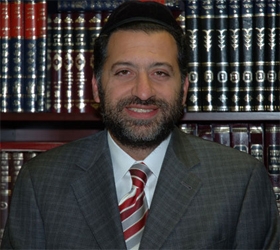We read in Parashat Miketz of Yosef’s miraculous rise to the position of vizier in Egypt. Having been brought to Egypt as a slave, Yosef was falsely accused of a crime and sent to prison, where he spent twelve years until being brought before Pharaoh to interpret his dreams. Pharaoh accepted Yosef’s interpretation, that the dreams foretold seven years of surplus which would be followed by seven years of famine, and he appointed Yosef as the one to oversee the storage of grain during the first seven years. This sequence of events led to Beneh Yisrael’s exile in Egypt, as Yaakob and his family found themselves without food in Eretz Yisrael, and they moved to Egypt where Yosef supported them with the grain that had been stored during the surplus years.
Many commentators raised the question of why Yosef, after being released from jail and being named second-in-command in Egypt, did not contact his father. He must have realized that his father was grieving for him and presumed he had died. Why did he not contact him, or go visit him? At very least, he could have invited Yaakob to Egypt. Why did he wait until the famine years, when his family back in Eretz Yisrael were languishing from hunger, before bringing them to reunite with him in Egypt?
Rav Moshe Alshich of Safed (1508-1593) offers a fascinating answer to this question, one which sheds light on the entire story of Yosef’s experiences in Egypt. He writes, based on the Zohar, that Egypt at that time was the source of Tum’a (impurity), the most immoral, decadent and sinful society in the world. The country was so filled with impurity that it was all but impossible for Beneh Yisrael to be unaffected by this impure force during their stay in Egypt. Indeed, over the course of the Egyptian exile, they plummeted to the 49th level of impurity – one level before the 50th level, from which they would have been unable to recover. When Yosef was brought to Egypt, he understood that he had an urgent mission to fulfill in preparation for Beneh Yisrael’s exile in the country. As an exceptionally righteous Sadik, Yosef was, as the Zohar describes, “Merkaba La’Shechina” – a “chariot” for the Divine Presence. He lived on such a high level of piety that G-d accompanied him at all times, as the Torah says, “Va’yehi Hashem Et Yosef” – “G-d was with Yosef” (Bereshit 39:2). He thus succeeded in reducing the impurity of Egypt enough so that Beneh Yisrael would not descend to the 50th level of impurity during their sojourn in the country. Although they fell to the 49th level, the effects of Yosef’s spiritual power beforehand protected them from falling to the 50th level and being lost forever.
Rav Moshe Alshich adds that this explains the significance of Yosef’s storage of grain in Egypt. The impurity in Egypt was so intense, the Alshich writes, that had Yaakob and his family partaken of the country’s food, they would have been irrevocably tainted by the spiritual contamination. The food one eats has a profound spiritual impact, and thus the impure food of Egypt would have had an indelible corrosive effect upon Yaakob and his family. It was therefore imperative that before the family came to Egypt, Yosef prepared for them by storing grain. Rashi (42:55) writes that all the grain which the Egyptians had stored during the surplus years spoiled, whereas all the grain which was stored under Yosef’s charge remained fresh. It turned out, then, that during the seven years of famine, all the food in Egypt had been stored by Yosef. By storing large quantities of grain during the surplus years, Yosef was preparing for his family’s arrival, as this ensured that all the food the family ate was free of the Egyptian impurity.
On this basis, the Alshich explains why Yosef did not contact his father during this time. He was involved in an urgent mission – to prepare the atmosphere and the food of Egypt for the long exile which would unfold. Even with all his efforts, Beneh Yisrael ended up descending to the 49th level. Had he ceased his vitally important work for even one day, his preparations would have been insufficient to protect the family and their descendants in Egypt. Yosef was thus unable to take the time to visit his father, and was also unable to invite them to live with him in Egypt, as they could not come until he completed his mission to prepare and ensure Beneh Yisrael’s spiritual survival in Egypt.
* * * * * * * * * * * * * * * * * * * *










